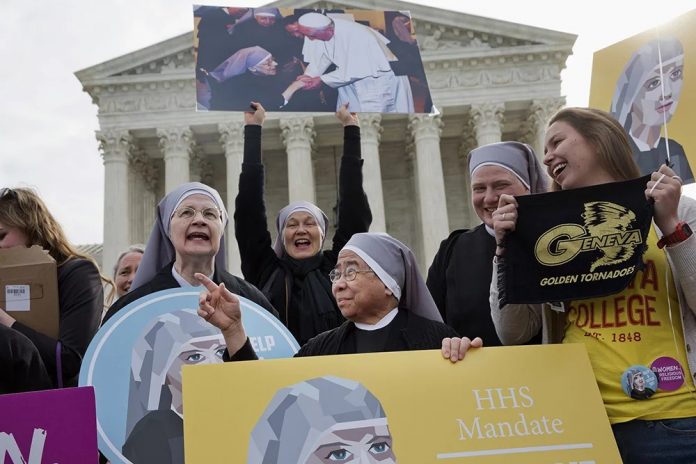The Rev. Thomas J. Reese, a Jesuit priest, is a Senior Analyst at RNS. Previously he was a columnist at the National Catholic Reporter (2015-17) and an associate editor (1978-85) and editor in chief (1998-2005) at America magazine. He was also a senior fellow at the Woodstock Theological Center at Georgetown University (1985-98 & 2006-15) where he wrote Archbishop, A Flock of Shepherds, and Inside the Vatican. Earlier he worked as a lobbyist for tax reform. He has a doctorate in political science from the University of California Berkeley. He entered the Jesuits in 1962 and was ordained a priest in 1974 after receiving a M.Div from the Jesuit School of Theology at Berkeley. The views expressed in this commentary do not necessarily represent those of BCNN1.
The Little Sisters of the Poor are back in court litigating the birth control mandate of the 2010 Affordable Care Act, which the sisters claim forces them to act contrary to their faith.
Seen as one of the signature achievements of the Obama administration, the ACA, also known as Obamacare, requires most employers to provide free birth control coverage to their employees through their health insurance plans. The sisters, who run nursing and retirement homes for the elderly, say this infringes on their religious freedom, since they would be paying for a practice that violates church teaching.
Haven’t we seen this movie before? Didn’t this issue get resolved by the U.S. Supreme Court in 2016 when it heard Little Sisters of the Poor Home for the Aged v. Burwell? Is this rerun truly necessary?
The answers are yes, no and, I would argue, no: The Supreme Court shouldn’t be required to settle what the parties ought to have settled themselves.
As someone who believes that women have a right to birth control but also believes that government should respect people’s religious beliefs, I see this controversy as both a tragedy and a farce. If there had been goodwill on both sides, litigation would not have been necessary. In fact, each side was suspicious of the other and any kind of deal became impossible. A pox on both their houses.
It all started badly when the Department of Health and Human Services published proposed regulations for implementing the contraceptive mandate. To say that they were poorly written is being polite. The HHS lawyers were experts in health care law, not issues of religious freedom. Asking government regulators to foresee the objections of Catholic nuns was like asking a divorce lawyer to defend you in a murder trial.
I know this is true because I got a call from one of the HHS lawyers asking for help. If they had to call me for help, they were in big trouble. I recommended they speak to Melissa Rogers, a brilliant lawyer and good Baptist.
The original regulations left the administration open to severe criticism both from religious groups and from Republicans who hated the ACA. They saw the regulations as a planned assault on religion rather than merely a case of incompetence.
Remember, at the same time, HHS had denied the refugee agency of the U.S. Conference of Catholic Bishops a government grant for helping trafficked people because it would not refer its clients for birth control or abortion services. It looked like an organized conspiracy against religious believers.
After a few more tries, the Obama administration finally issued regulations that completely exempted churches and provided a workaround for religiously affiliated employers like the Little Sisters of the Poor. The workaround was complicated because the insurance and constitutional questions are complicated, but in effect it allowed the institutions to offer insurance without birth control but required someone else — the insurance company itself or a third-party administrator — to provide birth control to their employees without charging the institution. The administration hoped that this would resolve the conflict.
There were problems with the workaround.
First, the institutions said the notion that insurance companies would provide birth control without charging them was a fiction. The administration responded with an economic study showing that it was in the insurance company’s financial interest to provide free birth control because it was cheaper than paying for births, especially complicated births. There really was no net increased cost for providing birth control.
Second, the government required the institutions to sign and send in to the government a form stating that they did not want birth control in their insurance plan. The Little Sisters maintained that even signing the government-mandated form would be “cooperating with evil.” They described it as a “permission slip” that would allow someone else to provide contraceptives.
Most Catholic moralists, as well as most Catholics, had no problem with Catholic institutions providing birth control through their health insurance plans. After all, Catholic institutions in Europe pay employee taxes for health insurance that provide not only contraceptives but even abortions.
Only the most scrupulous conscience would have a problem with notifying the government of their opposition to birth control. But the Catholic bishops and Little Sisters were being advised by extremely conservative moralists and lawyers. In addition, some bishops and Republican Catholics saw a fight over religious freedom with the Obama administration as politically advantageous. One cardinal archbishop, Francis George of Chicago, admitted he had hated Democrats ever since Mayor Richard J. Daley fired his father from a city job.
At one point, Cardinal Timothy Dolan of New York met with President Barack Obama to try to work out their differences. After the meeting, Dolan said he was hopeful matters could be resolved, but he was forced back off by other bishops.
Source: Religion News Service
All Content & Images are provided by the acknowledged source



